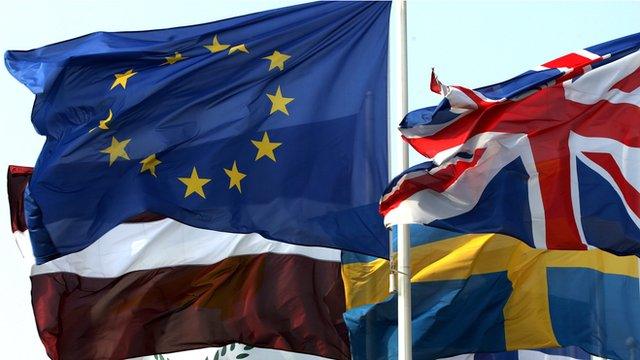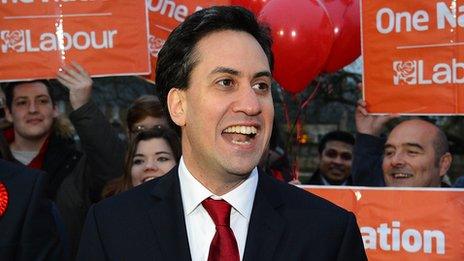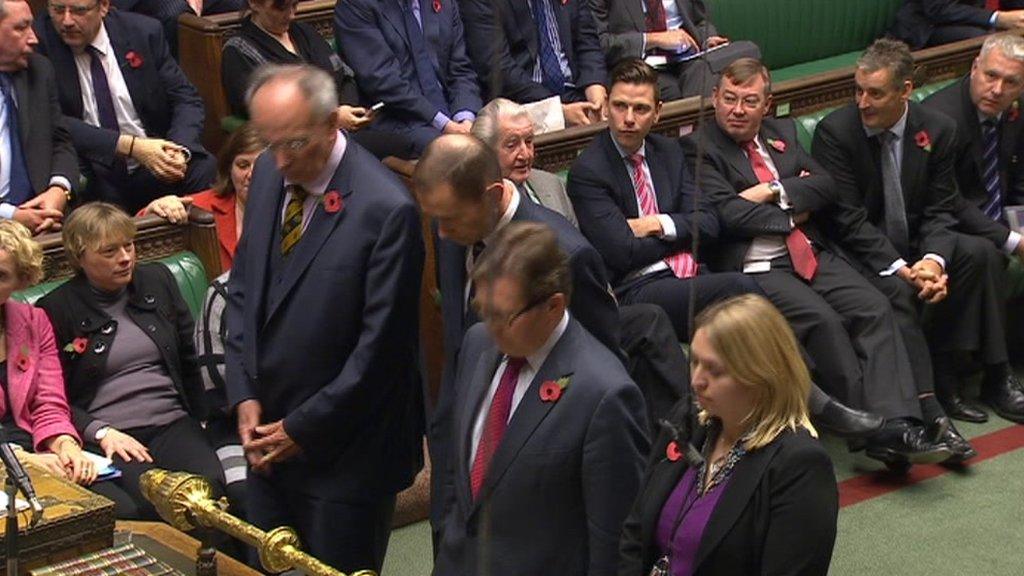EU budget: David Cameron says no cut to UK rebate
- Published
David Cameron, UK PM: "These are very important negotiations"
David Cameron has told EU leaders there can be "no question" of any further cuts to the British budget rebate.
And he told EU Council President Herman Van Rompuy there should be cuts in EU spending as a "symbolic gesture".
Mr Cameron, who is holding talks in Brussels ahead of a meeting of all 27 member states, has vowed to resist any increase in the EU's long-term budget.
Mr Cameron is seeking to build alliances with other leaders ahead of two days of budget negotiations.
Germany is among the UK's main allies, but other nations support the European Commission's call for higher spending.
France objects to proposed cuts in agriculture, while countries in Central and Eastern Europe oppose cuts to funding to improve infrastructure in poorer areas.
Mr Cameron met EU Council President Herman Van Rompuy and Jose Manuel Barroso, the President of the European Commission, to set out Britain's position.
He told them there was "no question" of any further cuts to the UK's multi-billion pound rebate first secured by the Thatcher government in the 1980s.
The rebate, which was meant to reflect the fact that the UK had a smaller agricultural sector than other nations at a time when most EU money went to farmers, is viewed as unfair by some member states.
Britain could be put under pressure to compromise elsewhere if it wants to keep the rebate, European Commission sources say.
Mr Cameron also called for be further cuts to EU spending, including administrative costs, on top of a 70bn euro cut proposed by Mr Rompuy, as a "symbolic gesture".
The prime minister has vowed to push for a freeze in the EU's budget, something he says has never been achieved before, and he has threatened to use Britain's veto to block any deal that is "bad for Britain".
'Good deal'
But he is under pressure from many of his own MPs and the opposition Labour Party to go even further and hold out for a real-terms cut.
He faces the prospect of defeat in the House of Commons when MPs vote, in about a year's time, on ratifying any deal reached in Brussels.
But if member states fail to reach a deal by March or April, the 2013 budget will continue into 2014 on a month-by-month basis, meaning the UK could end up with an EU budget higher than that which Mr Cameron is currently seeking.
Speaking to reporters as he arrived in Brussels, Mr Cameron said: "These are very important negotiations.
"Clearly at a time when we are making difficult decisions at home over public spending it would be quite wrong, it is quite wrong, for there to be proposals for this increased extra spending in the EU.
"So we are going to be negotiating very hard for a good deal for Britain's taxpayers and Europe's taxpayers and to keep the British rebate."
The BBC's chief political correspondent Norman Smith said Mr Cameron's strong rhetoric risked driving a wedge between the UK and its allies.
'Loaded gun'
Arriving at the summit, Dutch Prime Minister Mark Rutte suggested it would be wiser to "keep your loaded gun in your pocket" until later in order not to "put pressure on negotiations" before they had even started.
The EU's 27 member states must set a ceiling for what they are prepared to spend in total over the 2014-20 period, as well as discuss how much will be set aside for specific areas such as business, agriculture and security.
The European Commission's proposed budget for 2014-20 would see a 5% increase in spending on the current seven-year period, with a ceiling of 1,033 billion euros (£831bn).
Who wants what from EU budget deal?
The UK, Germany, Sweden and the Netherlands are among those who have said such a rise would be unacceptable at a time of austerity across the continent.
The UK has described a separate proposal from European Council President Herman van Rompuy for a 973 billion euro (£782bn) ceiling as a step in the right direction.
But the UK believes that further cuts, potentially of up to 80bn euros, can be achieved, as Mr Van Rompuy's plan anticipates substantial increases in certain areas such as infrastructure spending.
MPs voted last month to back a real-terms cut in spending.
But UK officials have acknowledged this will be difficult to achieve given many of the EU's poorer nations - unlike the UK, Germany and France - are net beneficiaries of the budget and unlikely to countenance any cuts.
Mr Van Rompuy is expected to hold other one-on-one meetings with EU leaders on Thursday to establish what their "red lines" are ahead of general negotiations, which officials admit could slip into Saturday or even Sunday.
German Chancellor Angela Merkel has said she is not sure the summit will come up with a "definitive deal" and EU leaders may have to reconvene early in the new year.
- Published22 November 2012

- Published24 September 2015
- Published18 November 2012

- Published31 October 2012
